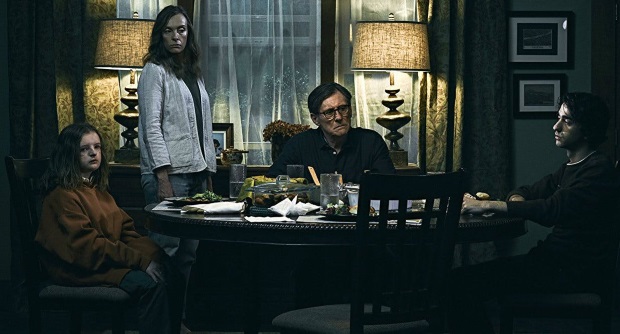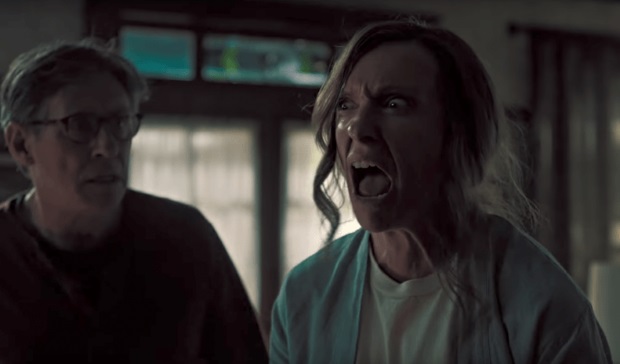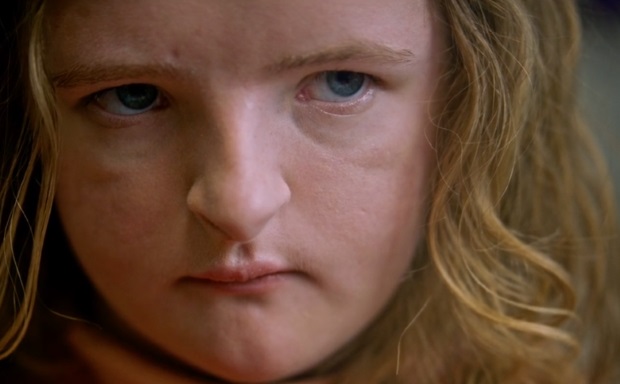Ari Aster interview: Hereditary, horror cinema
Director Ari Aster chats to us about the stunning Hereditary, his frustrations with horror cinema, and much, much more...
The horror movie of the year? That’d be Hereditary, an outstanding movie out of nowhere, that’s landed in UK cinemas now. We had a chance to chat to its director, Ari Aster, about the film. And we got talking about the state of modern horror too…
It’s not a pleasant experience, watching Hereditary!
I guess that depends on your constitution.
One thing very early on in the film, you explicitly state the themes – Peter is in class, and they’re discussing Greek tragedy, and they explicitly state themes that are relevant to the film.
Yeah, and it’s hopefully happening in the background, so it’s not so on the nose, but I see the film being pretty Greek in its qualities.
I’m trying to ask questions that don’t give too much away, but you have members of the cult lurking around the film.
Yeah, they’re hanging around the periphery of the central story. I think the film is ultimately – how do I not give something away – it’s a film about a long-lived ritual, of which sort I’ll leave the viewer to discover, from the perspective of people being used for that ritual. So we are with the characters in their ignorance of what’s really happening, and we’re piecing things together as they are, but then I also wanted the film to have a more knowing, sinister quality to it – we are with these people, but there’s another perspective here that we’re feeling, that we’re not totally aware of. The film itself knows what’s coming.
The film definitely feels like a horror film, but it also twists and turns in ways we’re not expecting. There’s one moment where you do something that very much goes against the choices I’d expect in a horror film.
Yes.
How far along into development were those decisions made?
Those were the first decisions that were made. I love the horror genre, I consider myself a genre filmmaker, I love genre, but I think there’s a certain amount of complacency that comes with watching a genre film; people know what the devices are, they know what the tropes are, they know the conventions. They come in with certain expectations, and the more films that mindlessly meet those expectations, the more passive a viewer you end up getting. There are so many examples of films that play with those things in the way that I’ve tried to here. The joy of making a genre film is that you have audiences in that place, and it’s a perfect place to start, because all it takes is finding ways to startle them out of that complacency and encourage a different kind of engagement. This is nothing new, a film like Psycho does this, and it’s done outside the horror genre, In The Bedroom does this in a very effective way.

Ultimately this is a horror film, and I hope it’s a really good one, and the goal was to make an unabashed horror film, one that really does aim to satisfy the genre’s demands, but hopefully in an unexpected way. At the same time, I was trying to use the genre to tell a story that in another genre might be too bleak and too punishing for an audience. For instance, the film is a family tragedy, and it is about grief and trauma, and it doesn’t end on a very hopeful note. If I did that as a straight drama, it might be a great film, but the promise of an audience is very slim. Suddenly if you take that story, and you bring it over here, what served as a deterrent to an audience in this one genre suddenly becomes a virtue in this other one.
I’d like to talk about the benefits of genre in a second, but there’s something you just touched on that I’d like to address, which is that it does feel like a family tragedy – it certainly feels like an exploration of grief in a way many films don’t have the courage or confidence to do – I’m curious where that came from, whether you were exploring something personal through this?
I can say that there are people who are very important to me, very close to me, who have gone through a lot, who have suffered a great deal. I’ve suffered in watching them suffer, and being close to that kind of suffering, so it was important to me to make a film that took that pain and suffering seriously. I think there is a tendency, especially among films in the States, but among family dramas in general – and again I think there is a great slew of exceptions to this – where for instance, a family suffers a loss, they have a hard time, things get tumultuous, communication breaks down, then eventually they find their way back together, their bonds are strengthened by what they’ve gone through, and then you get the bittersweet ending, where ‘we’ve been through a lot, but there’s always tomorrow’.
There’s nothing inherently false about that, we all need hope, but sometimes that doesn’t happen. Sometimes people suffer a blow, and they don’t recover, sometimes people are taken down by what happens to them. I feel that – especially when you’re making a film about suffering – if people who are watching it who are in that place, or have been in that place, or are navigating it at the time are in that theatre, there’s something quite depressing about the bittersweet ending, or the hopeful ending, because you don’t recognise it. Sometimes you want pain to be acknowledged, and not whitewashed, or erased by some exceptionalist point of view. I did want to make a film that took suffering seriously. I’m not sure I mentioned this, but I do see the film as owing a greater debt to domestic melodrama than even to the horror film, did I say that?

You didn’t, but it does make sense. Without going too deep into story-specific points, there is that moment where things have gone wrong, and then they get exponentially worse, and that definitely felt for me, as a viewer, that you’d hit that family melodrama mark, in a way that didn’t feel like a family melodrama.
Right, and that’s because it then spirals out of control, but in, I think, a way that is alo very true to the melodrama, because what is melodrama? It’s derived from ‘melos’, ‘music’, so drama as music. Here you have a film about people who are suffering, and they’re in great pain, and the film is aiming to honour those feelings, and the extreme emotions that they’re suffering through by ultimately being as big, and intense, and extreme as those emotions. So the film is mirroring what these people are going through by matching it in its story, and the narrative development, and in the style. In that way it’s also a very expressionistic film, the feelings of the people are there to be seen – you take what’s inside and you put it outside. I think, even as we move into Grand Guignol territory, that debt to the melodrama is still very much there.
You’ve touched on a couple more things that I’d like to go into there, but very quickly while we’re addressing genre, you described yourself as a ‘genre filmmaker’ there; do you think that you’re taken as seriously as you should be in light of that? It seems to have reduced in the last few years, but up until recently there was a sniffiness about horror films.
I have the same sniffiness, I think so many horror films are made extremely cynically, and it’s because there is a built in audience, and the films are easier to get financed because you can make them cheaply, and the upside is potentially huge. So a lot of studios are producing these films in a cynical way, and there are a lot of filmmakers who are producing them cynically, then there are a lot of filmmakers who, like me, who see the opportunity within the genre to tell very difficult stories without losing an audience – or while gaining an audience – but to answer your question, if I think I’m being taken seriously enough, absolutely I think I’m extremely lucky to have this audience I do with this film, and its being received better than I ever thought it would be. I always knew I was making a very alienating film, and one whose prime aim was to upset the audience in a very deep way, so if anything I’ve been shocked at how warmly received the film has been.

Do you have any idea why people are so keen on the film? When you say alienating, I’ll be perfectly honest, I felt very awkward with the film. Objectively I thought you made something incredible, but from an emotional point of view – and please don’t take this the wrong way – I never want to see your film again. But there are people who want to see it more than once – when I was in the screening, there was a critic who came back three days after his first go round to see the film again – given what you put people through with the film, I’m curious if you have any idea why that might be?
Why people want to come back? I think there are people who love the genre, and who long for the return of certain traditions that come back in fits and starts with different films. I think we have a slew of really great examples of really intelligently made, passionately made horror films, The Witch, Let The Right One In, there’s a wonderful South Korean film called The Wailing, that I just adore, but if anything I imagine what people are responding to is that I’ve taken the time to ground the story in a place of character, and I’ve taken the time to really establish the dynamic between these people. Again, whether it works or not is up for an audience to decide, I just know what I intended to do, and what I wanted to do, and I wanted to take time, and I wanted to immerse people in this atmosphere, with these people, what they’re going through, before then having all the horror elements grow out of that. Again, I can’t speak to whether I succeeded, all I know is what I intended to do, and one thing I’ve been very heartened by is that people seem to be responding to it.
Ari Aster, thank you very much.
Hereditary is in UK cinemas from Friday.